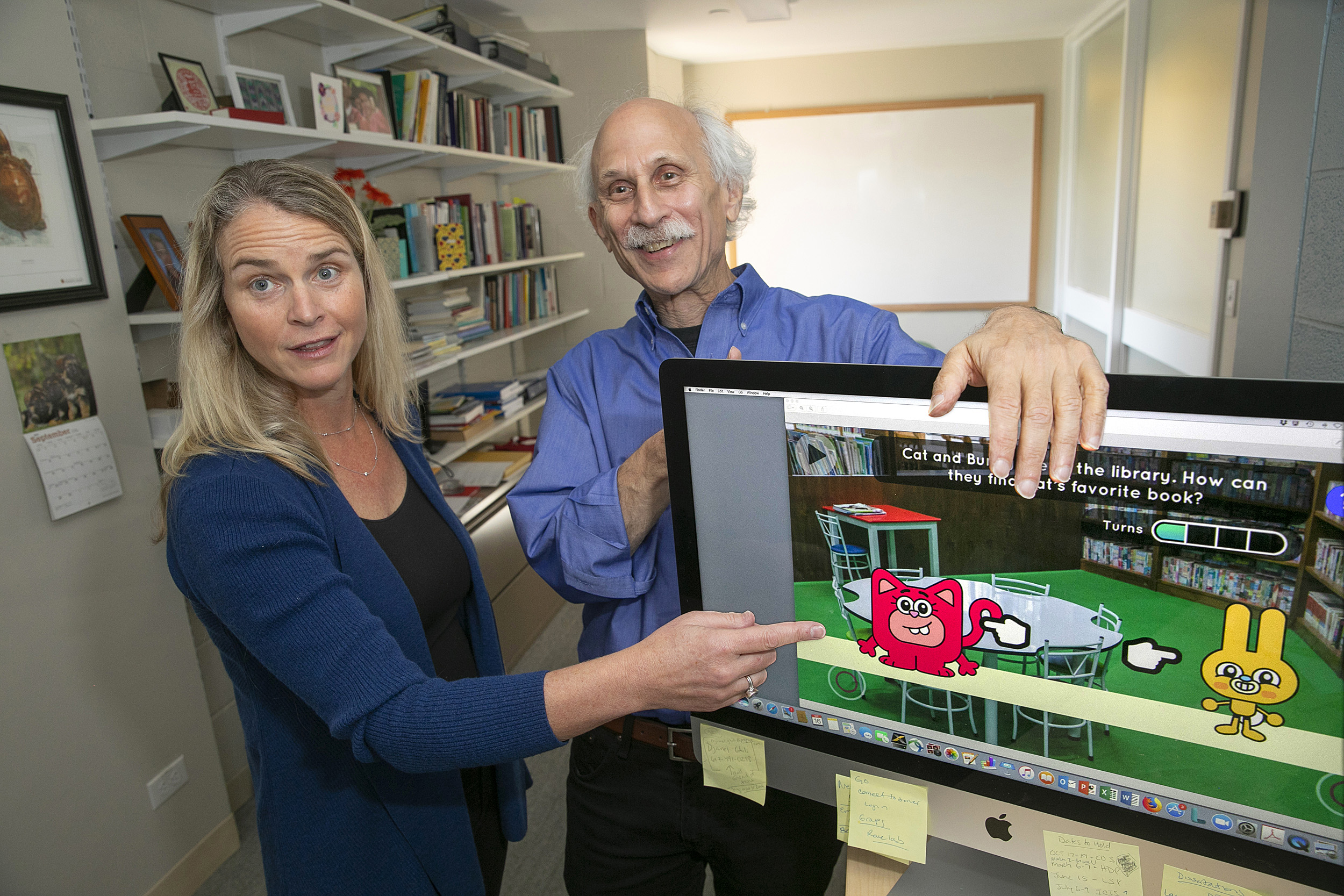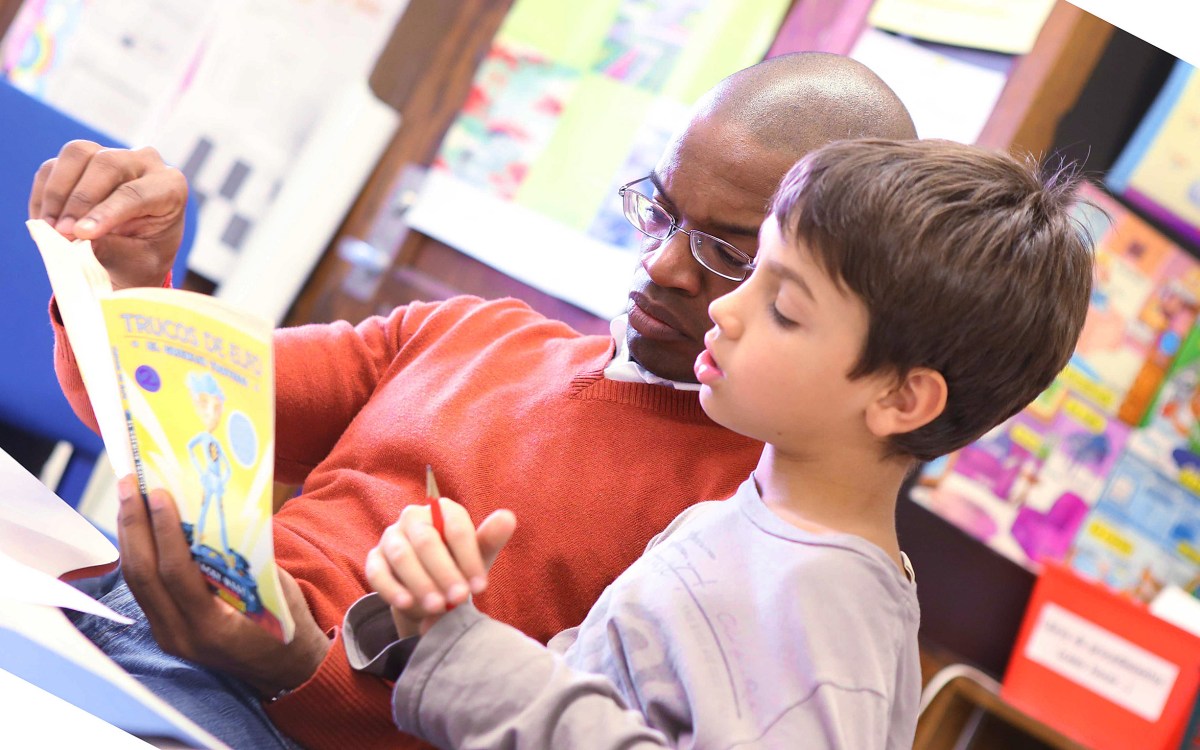
HGSE researchers Joe Blatt and Meredith Rowe developed three learning apps for parents of young children to promote literacy.
Jon Chase/Harvard Staff Photographer
Learning apps for parents that help kids
Educational programs promote and guide interactions that foster children’s literacy development
Nearly 80 parents and their young children took part in a recent study that used learning apps to create foundations for literacy. With interactive features and colorful visuals, the educational programs looked like standard fare but differed in one important way: The lessons are aimed as much at moms and dads as the kids.
Developed by FableVision, a Boston media production studio, the apps were designed as part of the Reach Every Reader project at the Graduate School of Education (HGSE) and were based on research on children’s early language and literacy development. One of the games, Story Mixer, asked users to create silly stories by mixing photos, sounds, and movements. Photo Play directed them to choose a portrait image and talk, decorate, or play a game with it. Animal Antics instructed them to role-play by choosing animals and emotions and recording their dialogue.
Together, the apps aim to elicit interactions in which parents can help their children learn how to sustain back-and-forth conversations, understand the concept of time by talking about things that happened in the past, and develop their vocabulary. All of these practices promote children’s literacy development, which is the foundation for success in school and life, said Joe Blatt, faculty director of the Master’s Program in Technology, Innovation, and Education at HGSE and the study’s principal investigator.
“At the School of Education, we spend a lot of time talking about overcoming various kinds of gaps some kids have when they arrive at school, such as vocabulary gaps and gaps in school readiness, more generally, but it’s my belief that better than trying to repair gaps is trying to prevent them,” said Blatt. “One strategy for preventing them is to get into families’ homes early and support parents in helping their kids be learners.”
Blatt, who is also a senior lecturer in education at the School, brought in Meredith Rowe, an expert on language and cognitive development in early childhood, to work on the study, which aims to measure whether the families used the apps, for how long, their favorite features, and how effective they were in imparting lessons to parents. Both researchers hope their work will help them develop better versions of learning apps that will eventually be available to a wider audience.
“We have a good idea about the features of the home environment that help promote learning,” said Rowe. “Reading books obviously brings in a lot of vocabulary words, as well as asking children questions and engaging them in conversation. We’re not trying to replace books in any way, but we wanted to see if we could also encourage the kinds of interactions that typically happen around books or other types of activities through the use of technology as well.”
“Often, as adults we’re on our phones and not interacting with children. This was something that adults could do with their children when they’re on their devices and could give them opportunities to engage with one another.”
Meredith Rowe, Saul Zaentz Professor of Early Learning and Development
Parents were advised to use the apps with their children, a departure from adults’ tendency to hand off their cellphones to their kids or allow them to use tablets without adult supervision. The goal was to promote behaviors among parents that have proven to be crucial in fostering children’s early literacy.
“Our general motivation was to create apps that would get parents and children talking back and forth, having conversations,” said Rowe, the Saul Zaentz Professor of Early Learning and Development. “Often, as adults we’re on our phones and not interacting with children. This was something that adults could do with their children when they’re on their devices and could give them opportunities to engage with one another.”
Researchers are analyzing the study’s results, but from an observational point of view, parents reported learning new strategies they could use to help their children, said Rosa Guzman, a Ph.D. candidate at the Graduate School of Arts and Sciences and the supervisor of eight research assistants who visited families in their homes over the summer.
Families were recruited in Greater Boston, New Hampshire, and Rhode Island. Half were non-white and more than 75 percent had a yearly family income of less than $75,000. The education of the parents ranged from some with bachelor’s degrees to others with only a high school education.
“Most parents already knew they should read to their kids every day,” said Guzman. “But what they learned from us was that you can facilitate your child developing language and literacy just by talking to them about everyday things. Some parents said, ‘I thought I only had to read to my kids and teach them letters and numbers.’”
Ultimately, the apps were built to inspire parents to develop new practices to support their children’s learning as a regular part of their daily routines, Blatt said.
“The apps were to make things easier and more fun for parents,” said Blatt. “They provide a lot of structure and prompts to help parents get going, but we hope parents will continue the conversations they started. It could be in the grocery store, on the bus, or in the doctor’s office, not just sitting with the app. The apps are meant to spark something and help develop a behavior, and we hope that that behavior will continue.”
[gz_banner_50states /]







